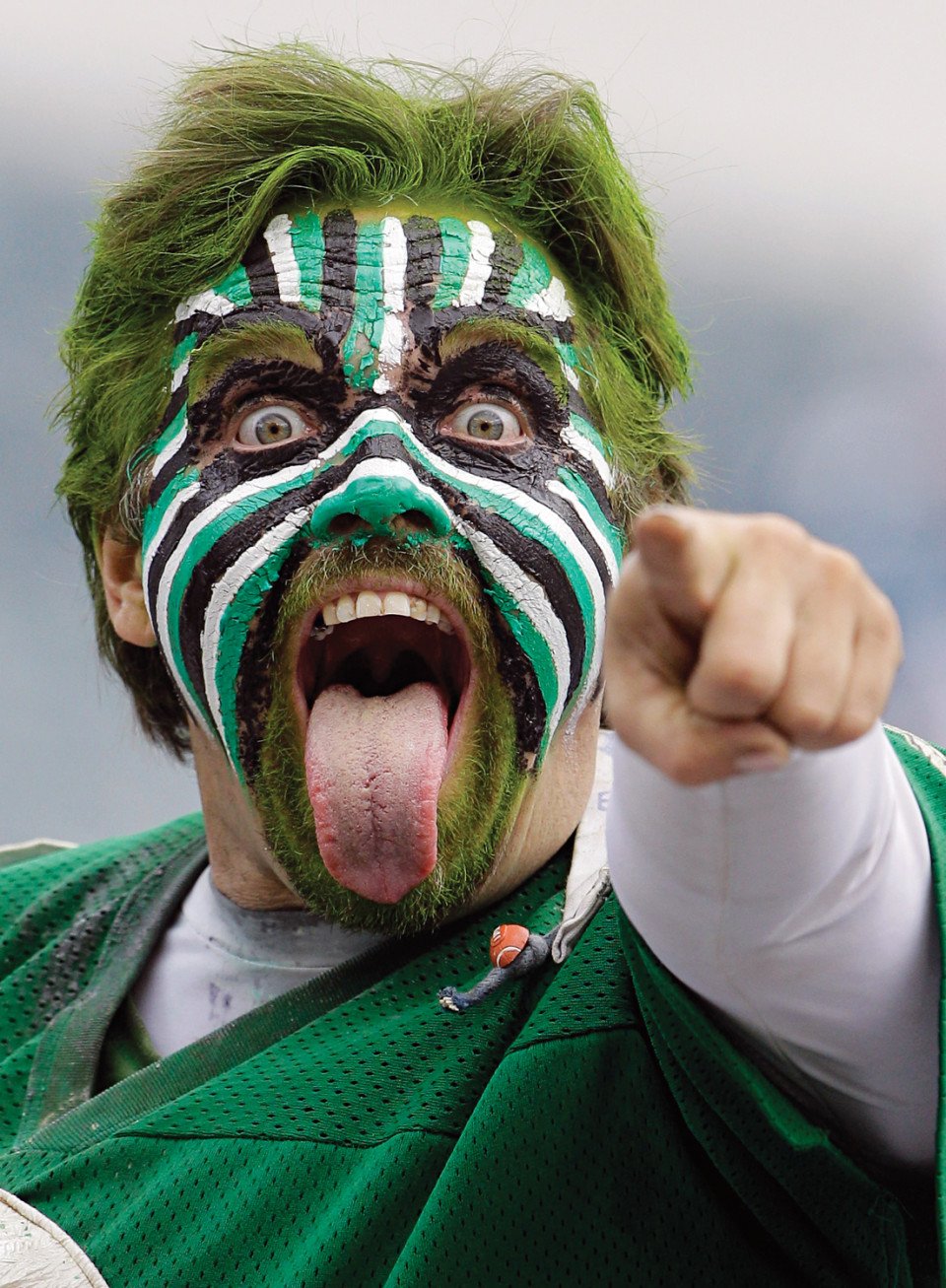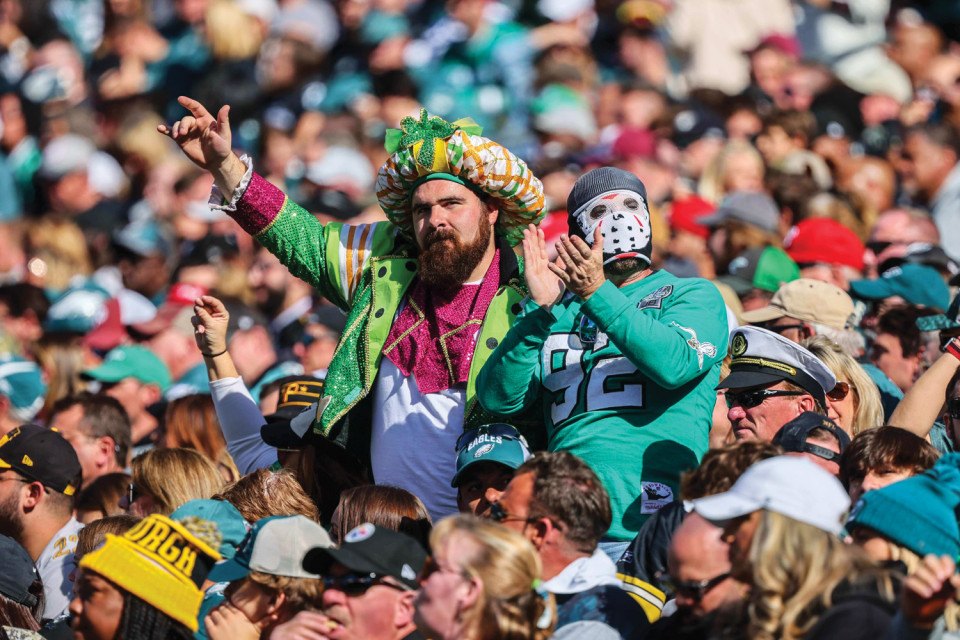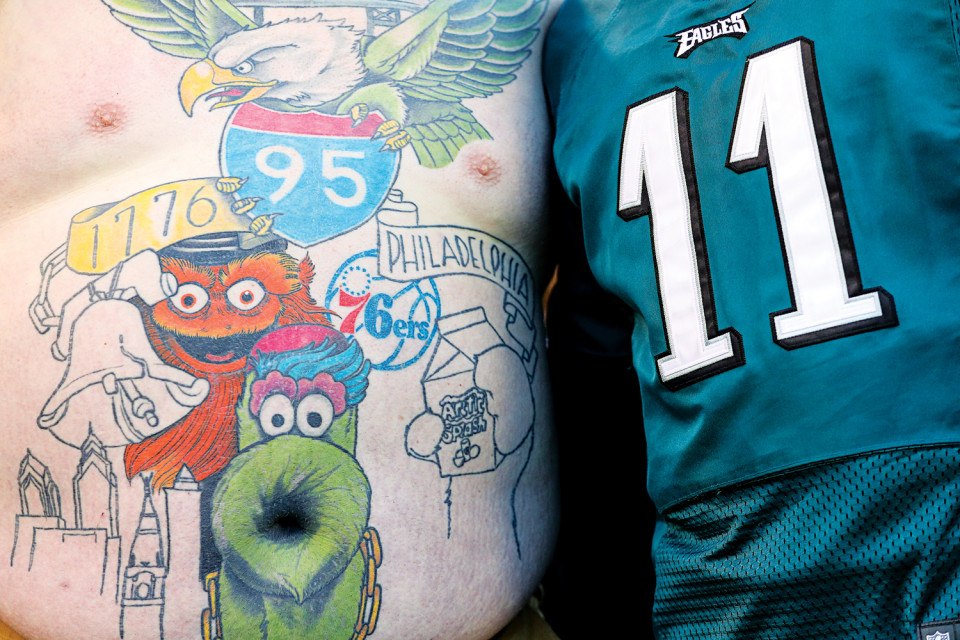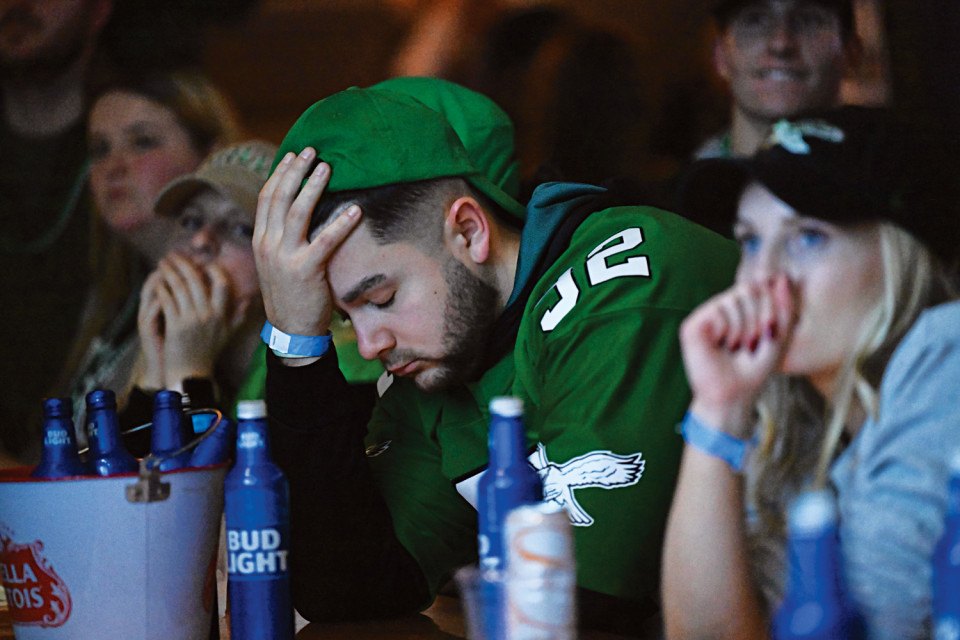Psyched Up: Inside the Weird Minds of Eagles Fans
Are Eagles fans as out of our minds as everybody says we are? You bet — and damn proud of it! So we decided to ask local experts in sports psychology: How’d we get this way?

Eagles fans are … unique. / Photograph by Rob Carr/Getty Images
By now, the tales about us are legend. We boo Santa. We throw snowballs at opponents. Our head coach put bounties out to encourage maiming other teams’ players — and we cheered the fact. We’ve had to ban alcohol sales at games. To deal with miscreants, we opened an outlet of municipal court — with a jail! — inside our stadium. So it’s really no surprise that Eagles fans are ranked the worst (though here, we think that means the best) in the whole wide world of sports. Just check any of the many, many online “Worst Fans” lists.
Which to us seems perfectly normal, since we live here.
Still, as another football season dawns, bringing with it more opportunities to cement our reputation with fresh horrors, we find ourselves wondering: What made us this way? Is it something in the wooder? An overdose of protein from cheesesteaks? A holdover from our rebellious Revolutionary past? How does an entire city have manners so appalling that even battle-toughened NFL opponents say they hate playing here?
For answers, we turned to a stable of sports shrinks — coaches and experts whose specialty is helping athletes cope with the vicissitudes of the sporting life: the mental challenges, the pressures, the ups and downs, the roars of the crowd — and oh, those boos. Here’s what they had to say.
Location, Location, Location
“If there was a bell curve,” says Stephany Coakley, “Eagles fans would be in the top two to four percent of extreme sports-team fans.” Coakley, who holds a doctorate in exercise and sports science and for several years was the rookie success facilitator for the Eagles, now serves her alma mater, Temple, as senior associate athletic director for mental health, wellness and performance. (It’s a mouthful; she knows.) She attributes some of the Philly fans’ — well, let’s call it intensity simply to our geography, by which she means our proximity to our Mighty Neighbor to the North.
Meg Waldron, a mental performance coach with a master’s in sports psychology, agrees. “It’s easy to have a chip on your shoulder when you’re so close to New York City and its thriving sports machines,” she tells me. “A lot of famous and wealthy people live in New York and show up at pro games. It’s a different environment there.”
Hold on, hold on — don’t the Eagles have famous fans, too? We were a category on Jeopardy once! What about Bradley Cooper? Rob McElhenney? Princess Diana? Quinta Brunson? Hey, Taylor Swift gave the Birds a shout-out while she was here!
It’s true; she did. But Philly has certain … challenges. Poorest big city in America. Sky-high murder rate. Worst city for drivers. Sheesh, worst city for sleep! “The Philadelphia we see in the press,” says Pietro Miazzo, a professor of clinical psychiatry and behavioral science at Temple, “compared to its peers, isn’t doing so great.”
Fair enough. But, Waldron notes, there’s a flip side to that: Without travail, what is there to overcome? “Our identity in Philly is the struggling underdog,” she explains. “If you don’t have much going well in your surroundings, an Eagles win can feel like you just hit the lottery.”

Fans in the stands at last season’s Eagles/Steelers game
at the Linc / Photograph via ZUMA Press, Inc./Alamy Stock Photo
It doesn’t help our shoulder-chip that this city used to be the locus of the world’s attention, where a budding nation’s leaders gathered to foment a revolution unlike any other in human history. Proud as that might make us, it was two and a half centuries ago. “We have struggled with hard times for a long time,” Waldron says. “Crime, drugs, poverty, blight — some would say Philly has been slow to improve the quality of life for its citizens compared to New York City or D.C. Maybe the rabid nature of the fans here comes down to frustration with a lot of things about Philly and a need to act out.”
But that has-been hangover only feeds our fan intensity. “When the Eagles won the Super Bowl in 2018,” says Coakley, “they were underdogs, right? Remember everybody wore those masks? And then when we went to the Super Bowl this year, everyone was wearing stuff that said, ‘It’s a Philly thing.’ That was the narrative. It’s part of the Philly attitude.” Who’d want to live in some bright, shining burg on a hill? “This city has its roots in the working class,” Coakley adds. “We take pride in that grittiness.”
“With the stadium right within walking distance to populated working-class neighborhoods,” Waldron notes of the Linc’s rowhouse-dense environs, “the Eagles truly are a home team.”
Even the male-centric nature of Philly’s history — quick, name one founding mother besides Betsy Ross (and she worked a needle!) — makes football a natural match for fan fervor. “There’s something about football that’s a little different,” muses Baille Jones, a therapist specializing in sports psychology (and, like Coakley and Waldron, a former athlete herself). “There’s something about seeing that clash and that intensity. You think back to ancient Rome and the gladiators. Really, at our core, we are animals.” Grrrr! “Fans are geared up by that. They emulate what’s happening on the field.” And in Philly, the fans, Jones acknowledges, “take it up a notch.”
It’s a Guy Thing?
The gladiator analogy helps explain why football aficionados tend to be male. Not that there aren’t plenty of rabid Bird Ladies, but a survey this year by Statista showed that 51 percent of all U.S. men consider themselves “avid” NFL fans, compared to 24 percent of U.S. women who say the same. “The stereotypical fan,” says Jones, “is a big guy, right, who doesn’t show a lot of emotion otherwise? It’s a safe way for men to express themselves.”
In particular, blue-collar men — the sort our city is full of. Guys who’ve seen themselves beset by myriad woes since the days when their neighborhoods were buzzing with factories and manufacturing plants — back when men, you know, made things and had a resultant sense of accomplishment. “Your life is tough,” Coakley summarizes the current situation. “You have bills. You have family challenges. But from one to four or four to seven or seven to 11 on Sundays, you can just root for the Eagles and forget all that. You can be happy. You’re on an emotional roller coaster — and it’s a fun roller coaster when the team is winning.”
“It’s an acceptable way in our society for men to express themselves emotionally,” Waldron concurs. “We have a long history of unrest and economic instability in this city. Football provides a way for men to vent their frustration in a society that doesn’t always allow for that kind of emotion.”
“Last year,” Coakley remembers, thinking of that era of greased light poles and impromptu parades and general civic mayhem, “there was so much joy!”

Eagles fans wear their hearts on their sleeves — and everywhere else. / Photograph by Patrick Smith/Getty Images
The Sport of Anti-Kings
There’s yet another link between our blue-collar roots, our history as the birthplace of the Revolution, masculinity, and the game of football — one explored at length by Philly-based ESPN reporter (and former Inky scribe) Sal Paolantonio in his 2008 book How Football Explains America. The game itself is a metaphor, a reproduction in miniature of our nation’s — well, manifest destiny, the 19th-century doctrine holding that God Almighty fully intended for white European settlers to spread from sea to shining sea. Football, Paolantonio writes, is “a violent confrontation of men fighting over territory”:
It always comes back to the story, the romance, the sensation of following that one character across the plains, across the universe, across the gridiron, to the final destination — all the way fighting the elements, the Bad Guys, the Mad Stork, Mean Joe Greene, the Purple People Eaters, L.T., the No Name Defense, the Evil Empire, Darth Vader — take your pick.
Why else, Sal asks, is football strictly an American obsession (despite sporadic attempts to export it to other nations; witness the Eagles’ nascent marketing attempts in Australia, New Zealand and Ghana)? He quotes former NFL player and current Oregon State emeritus professor Michael Oriard: “Simply put, sport is an expression of people’s culture. Football, the game itself, the narrative on the field, is uniquely an expression of who we are.” If it was mostly men who fought the Native Americans and marched relentlessly across these plains — and is solely men who man the field today — no wonder fans are mostly male.
It also helps that the game is, um, easy to follow. “With basketball,” says Jones, “it’s more complicated. Not everybody understands the different rules, what constitutes a foul, what stops the play. In football, you have four downs. You’re excited about getting to the goal.” It’s true, she acknowledges, that every now and then, there’s something like the sudden collapse of Buffalo Bill Damar Hamlin last season. “You see that, and you go, ‘Oh, wow, this can really get serious.’” But even then, she adds, “The darkness is part of the excitement. It’s like watching a horror movie, but in a controlled environment. The players have all this protective gear. And there are rules.”
And rabid fans make better players. “Healthy fandom helps the team,” Coakley says. “Teams need to have somebody to really believe in them.” She points to the emptied arenas in which games were held during the COVID pandemic: “That was the worst for the players. Having fans is part of the competition. You need that, as an athlete.”
But that, naturally, raises the question: Is it healthy for us, as human beings and as a city, to be so invested in what is, historical echoes aside, just a freaking game — and a dangerous one at that? “I don’t think healthy or unhealthy is the right kind of opposition,” Miazzo muses. “It just is. It feels right at the moment.”
And in the end, both winning and losing are part of the game, Waldron mentions: “When we expect a team to fail, as so many Philly teams have, and our identity and our hopes are closely tied to that team, we’re that much more energized to support and defend them at all costs.”

Sometimes, things don’t go so well. / Photograph by Nic Antaya/Getty Images
That Indomitable Spirit, Yada Yada
Miazzo says that in his opinion, Philly football fans’ behavior isn’t all that distinctive: “Every city has that unity. We’re not especially prone to that.” What loosens our more civilized inhibitions, he says, has to do with a simple human trait: “When you belong to a crowd, you start acting like you’re a member of a bigger mass. The member is drawn in by that sense of belonging.”
And that’s a very relatable need. “At our human core,” as Waldron explains it, using — natch — a sports metaphor, “being a sports fan levels the playing field. We can feel more connected, even with strangers, through this passion — less isolated, less afraid of each other.”
“It makes us braver when everybody else does it,” Miazzo agrees, mentioning that mass fandemonium reminds him of how he dressed when he was a teenager: “It was horrific! But everybody did it, out of that need to belong, to be part of something.”
“You’re part of something greater,” Coakley explains. “‘I have to support the Eagles to get them to the Super Bowl’ — you really believe that!”
Or as Jones puts it, “It gives us something to care about without showing much personal vulnerability. In a way, that’s fandom in a nutshell. You see people in Wawa wearing the gear, and you connect with them: Go Birds! You’re all cheering for and working for the same thing.”
And that, at its crux, is the secret of Philly fandom. “It’s part of human nature,” Coakley says, “to want to belong, to be part of something. We have teams we follow; we have political parties. We’re fans of Game of Thrones or Succession … our brains are hardwired to want to connect and belong.” But in our city, she adds, “There are certain elements of our cultural personality that intensify this. Philadelphians are passionate about everything from our teams and our athletes to our sandwiches to how you pronounce certain words.”
And it’s rather miraculous, really — like that one at the Meadowlands back in ’78 — that anything can unite the independence-minded, Quaker-ornery, neighborhood-centric, stranger-suspicious citizenry of this region in our day and age. Philly, as Waldron puts it, “is a big city with close suburbs that make for a lot of economic and social diversity. Supporting the Eagles pulls us all together despite those differences. A Philly win can raise the bar on our own lives and make us feel happy, strong and even hopeful. And if one of our teams loses? At least we’re all together in that defeat, which makes it easier to accept.”
Miazzo, who’s a native of Italy, quibbles with the notion that football fans here are especially beyond the pale. “Is it that we’re so much more aggressive or violent?” he ponders. “I don’t think so. Philly fans maybe like to brag that they are.” Besides, soccer, he argues, has the same effect in Europe: “You hear terrible stories about fan behavior there.” But do they boo Santa Claus in Rome, Pietro? Nah, we didn’t think so. Besides, what would you know? You’re not even from around here.
Published as “Phandemonium” in the September 2023 issue of Philadelphia magazine.


